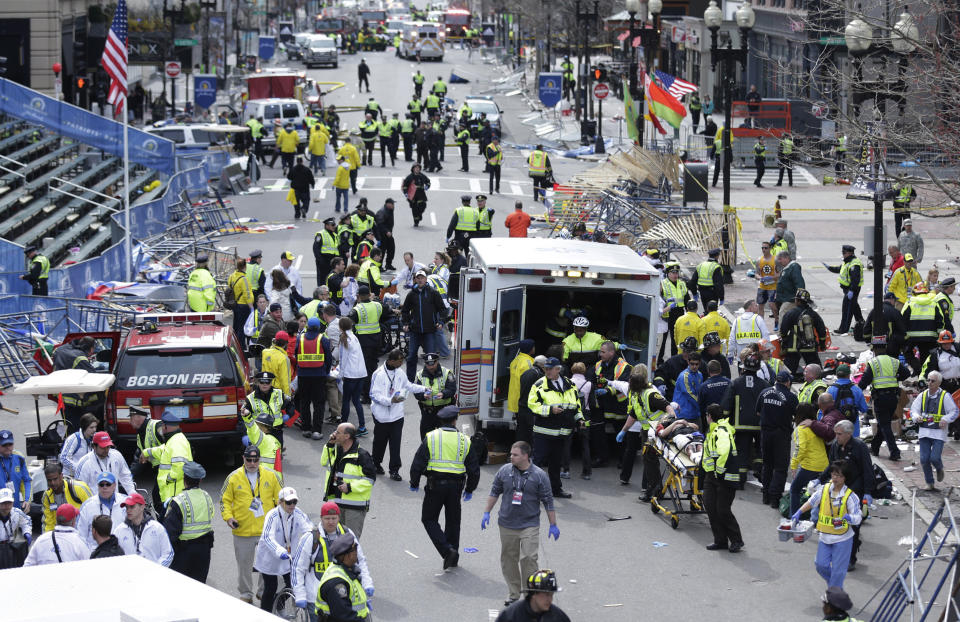Supreme Court appears likely to allow death sentence for Boston Marathon bomber
- Oops!Something went wrong.Please try again later.
- Oops!Something went wrong.Please try again later.
- Oops!Something went wrong.Please try again later.
WASHINGTON — A divided Supreme Court seemed prepared Wednesday to allow the death sentence to be reimposed for Boston Marathon bomber Dzhokhar Tsarnaev after a federal appeals court voided it.
A majority of the justices suggested that they did not agree with defense claims that the trial judge improperly restricted the questioning of prospective jurors or was wrong to exclude evidence of a separate crime two years before the bombing.
Tsarnaev was convicted of joining his older brother, Tamerlan, in planting two pressure-cooker bombs near the marathon finish line in 2013 that killed three people and injured hundreds more, many of them seriously. In a separate phase of the trial, the jury recommended capital punishment for the deaths of the two people killed by the bomb that he placed.

But a three-judge panel of the U.S. Court of Appeals for the 1st Circuit last year ordered a new sentencing hearing. It ruled unanimously that the trial judge failed to allow enough questioning of potential jurors about how closely they followed the extensive news coverage of the bombings.
The appeals court also said the judge should have allowed Tsarnaev's lawyers to bring up a 2011 triple killing in the Boston suburb of Waltham that investigators suspected was committed by Tamerlan. The defense wanted to use it to show that the younger Tsarnaev was dominated by his violent older brother, and was therefore less responsible for the bombings because of Tamerlan's influence.
Tsarnaev's lawyers did not deny his role in the marathon bombing, but they said he was easily manipulated by his brother, a man they called the mastermind.
Although Attorney General Merrick Garland has ordered a moratorium on executions in the federal system, the Justice Department under President Joe Biden is nonetheless taking the same position that it did under the Trump administration, defending the death sentence for Tsarnaev.
During 90 minutes of courtroom argument Wednesday, few of the justices seem concerned about the judge's limit on questioning jurors. But some suggested they believe he was wrong to block evidence of the Waltham murder.
"The court let in evidence about Tamerlan assaulting people because it showed the kind of person he was, and yet it kept out evidence that he led a crime that resulted in three murders?" asked Justice Elena Kagan. "The court refused to allow evidence of a gruesome crime."
And Justice Stephen Breyer said that evidence was central to Tsarnaev's lawyers' arguments during the penalty phase. "This was their defense," he said. "They agreed he was guilty."
But Justice Department lawyer Eric Feigin said the evidence of who committed the Waltham murder was unreliable. Tamerlan and another man suspected to have been at the scene were both dead by the time of the trial. "The investigation had hit the end of the road. There was no way to know what happened," he said.
Chief Justice John Roberts seemed to agree. "It would focus the jury on something the judge concluded couldn't be resolved," he said.
Justice Samuel Alito said admitting the evidence would complicate the penalty phase. "You'd have another trial within a trial about what happened," Alito said.
Feigin also said allowing evidence of the older brother's involvement in a separate crime, with a different accomplice, in an apparent effort to get money, could be confusing and distracting to the jury.
The government has also argued that an order to hold a new sentencing hearing would further traumatize the Boston community, saying, "The victims will have to once again take the stand to describe the horrors" that Tsarnaev inflicted on them.
Massachusetts Gov. Charlie Baker, a Republican, said he supported the government's effort to reverse the lower court ruling. "I said a long time ago that I thought Tsarnaev should face the death penalty. So I would agree with the Biden administration on that one," he said.
Many survivors of the bomb also support the death penalty for Tsarnaev. Marc Fucarile, who lost his right leg in the bombings, said of capital punishment, "It's there, and his actions call for it."
But Bill and Denise Richard, whose 8-year-old son was killed in the bombings, said despite the heinousness and brutality of the crime, they have a different view. "The continued pursuit of that punishment could bring years of appeals and prolong reliving the most painful day of our lives," they wrote in a letter published in the Boston Globe in 2015.
If the court rules for the Justice Department, Tsarnaev will remain on death row at Colorado's supermax prison. If it were to rule for Tsarnaev, the Biden administration would have to decide whether to try again to seek the death penalty or let his sentence of life in prison on the non-capital counts stand.
Either way, he'll never get out, a point noted by the appeals court. "Make no mistake: Dzhokhar will spend his remaining days locked up in prison, with the only matter remaining being whether he will die by execution," Judge O. Rogeriee Thompson wrote.

